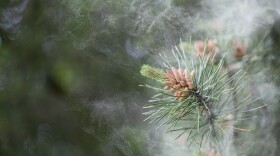-
When Hurricane Helene ripped through western North Carolina, it downed power lines, leaving tens of thousands of residents without electricity for days, even weeks.
-
A wildlife biologist with the North Carolina Wildlife Resources Commission talks with Due South's Leoneda Inge about North Carolina's black bears and their adaptation to increased interactions with humans.
-
If you live in North Carolina, or anywhere else in the U.S., you’ve probably heard all about PFAS. These are human-made chemicals that are long lasting. Now, people in the eastern part of the state are trying to protect themselves from these chemicals with a high-tech water filtration system that filters out PFAS.
-
Competition for the two hunting permits would be steep.
-
Another year, another drought for North Carolina farmers, who head into spring planting season with a lot of uncertainty.
-
The North Carolina Wildlife Resources Commission is working to cut down on bear and human conflicts this spring.
-
The National Weather Service says increased fire danger could affect portions of central North Carolina and the western Piedmont.
-
‘The Pollening’ has begun. Blankets of yellow springtime splendor are coating North Carolina. You may already be reaching for the tissues. We get a forecast.
-
Due South's Jeff Tiberii talks to a Warren County hemp farmer and a North Carolina State University researcher about the challenges and opportunities in transitioning from tobacco to industrial hemp farming.
-
The N.C. Department of Environmental Quality is continuing Chemours’ search for groundwater contamination beyond the Lower Cape Fear.
-
Due South's Leoneda Inge talks to NC State University professor Lincoln Larson about how job cuts at federal agencies can impact spring and summer travel, tourism dollars, and protected ecosystems in North Carolina.
-
En nuestra serie, Trabajadores Agotados, analizamos el impacto del calor extremo en los trabajadores















